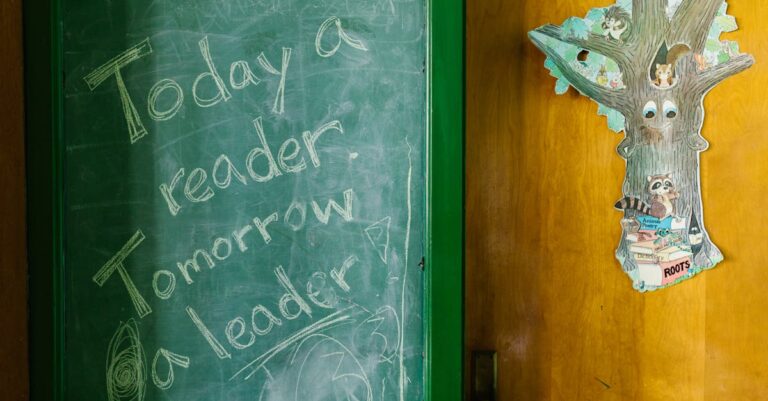In today’s fast-paced world, early childhood education isn’t just a nice-to-have; it’s a must-have. It’s the secret sauce that sets the stage for lifelong learning and success. Imagine a classroom where tiny hands explore, curious minds ask questions, and laughter fills the air—sounds like a recipe for greatness, right?
Table of Contents
ToggleOverview of Early Childhood Education Today
Early childhood education plays a pivotal role in shaping young minds. It focuses on children from birth to age eight, a period marked by rapid development. Programs emphasize social, emotional, cognitive, and physical growth.
Data shows that high-quality early education can significantly improve lifelong outcomes for children. In fact, research indicates that children who attend quality early childhood programs are more likely to succeed academically and socially. Skills developed during this stage lay the groundwork for future learning experiences.
Diverse teaching methods are common in early childhood settings. Experiential learning engages children through hands-on activities, fostering curiosity and exploration. Teachers often use play-based approaches to enhance learning, making the process enjoyable.
Family involvement is crucial in early education. Support from parents helps reinforce learning at home, creating a consistent environment for growth. Encouraging parental engagement contributes to better outcomes for children, as families and educators work together towards shared goals.
Trends continue to evolve, adapting to the needs of modern society. Increased emphasis on inclusion ensures that children of all abilities benefit from early education. Technology integration also supports learning, offering innovative tools for both educators and students.
Policies promoting accessibility make early childhood education available to more families. Government initiatives in various regions aim to expand opportunities, ensuring that every child has access to quality early education. This ongoing commitment underscores the value placed on early childhood development in today’s society.
Key Components of Early Childhood Education
Early childhood education relies on several key components that contribute to children’s development and learning.
Curriculum Development
Curriculum development in early childhood focuses on providing age-appropriate, engaging, and flexible learning experiences. Prioritizing play-based and experiential learning fosters exploration and creativity. Educators design the curriculum around children’s interests and developmental stages. Incorporating various subject areas, like language, math, and science, ensures a well-rounded educational experience. Research indicates that high-quality curricula correlate with improved lifelong outcomes. Programs that adapt to children’s needs and include family involvement enhance engagement and retention of knowledge.
Teacher Qualifications
Teacher qualifications play a pivotal role in the effectiveness of early childhood education. Certified early childhood educators possess a deep understanding of child development and learning strategies. These professionals often hold degrees in early childhood education or related fields, equipping them with essential knowledge. Ongoing professional development ensures they stay current with best practices and educational trends. Studies show that teachers with higher qualifications contribute to better student outcomes. Advocating for well-trained educators reflects a commitment to fostering children’s growth and learning in early childhood settings.
The Importance of Play in Learning
Play serves as a vital component in early childhood education, facilitating natural exploration and discovery. Engaging in play enhances children’s cognitive and social development.
Play-Based Learning Approaches
Commonly used, play-based learning methods prioritize hands-on experiences. Montessori and Reggio Emilia approaches encourage autonomy and creativity, fostering critical thinking skills. During play, children explore concepts in tangible ways, making abstract ideas concrete. Teachers guide these interactions, stepping in to enrich the learning experience. These strategies support varied learning styles and encourage experimentation. Opportunities for collaborative play deepen social skills and strengthen peer relationships.
Benefits of Play in Education
Play boosts engagement and motivation among young learners. Research shows that children participating in play-based programs demonstrate improved problem-solving skills. Social competencies flourish as children learn to communicate and share with their peers. Emotional regulation develops through guided play scenarios. Physical play enhances motor skills essential for daily activities. Consequently, experiences during play not only provide enjoyment but also lay the groundwork for academic success. Engaging in play cultivates a lifelong love for learning, setting the stage for future educational endeavors.
Challenges Facing Early Childhood Education Today
Funding and resources significantly impact early childhood education quality. Limited state and federal funding restricts program availability and places a strain on facilities. Many programs struggle to hire qualified educators due to inadequate financial support. Resources for training and classroom materials are also lacking, hindering curriculum development. Research shows that investments in early education generate substantial long-term benefits. Prioritizing funding boosts educational outcomes, as evidenced by data linking funding levels to student success.
Access and equity issues remain persistent challenges across early childhood education. Geographic location often determines availability, leaving rural and underserved communities with fewer options. Families face barriers, such as high tuition costs and limited information about available programs. Data highlights that children from low-income backgrounds are less likely to enroll in quality early education opportunities. Ensuring equitable access to resources promotes inclusivity and fosters diverse learning environments. Addressing these issues supports all children’s growth and secures better future educational outcomes.
Innovations in Early Childhood Education
Innovations in early childhood education focus on enhancing learning experiences and fostering development. Significant advancements in teaching methodologies and community partnerships emerge as key components.
Technology Integration
Technology integration transforms early childhood classrooms, providing diverse interactive tools. Digital resources engage children and enhance learning through apps, games, and online platforms. Educators utilize tablets and educational software to familiarize children with technology, laying the groundwork for future digital literacy. Data shows children exposed to technology from an early age tend to adapt more easily to tech-driven environments in later education. Tools like interactive whiteboards allow for collaborative learning experiences that cater to various learning styles. Ensuring that technology supplements rather than replaces playtime is crucial for balanced development.
Community Involvement
Community involvement strengthens early childhood education by fostering collaborative relationships between families and schools. Local organizations provide resources, workshops, and support programs for parents. Engaging families helps reinforce learning at home, creating a seamless educational experience. Data indicates that children whose families participate in school activities demonstrate improved social and academic skills. Events and initiatives serve as platforms for parents to connect with educators, building trust and open communication. Additionally, community partnerships enhance resources available to educators, enriching curriculum and expanding opportunities for all children.
Early childhood education today stands as a cornerstone for developing future generations. Its focus on play-based learning and inclusive practices creates environments where children thrive. The integration of technology and community involvement further enhances these experiences, ensuring children are well-prepared for the challenges ahead.
As society continues to evolve, so must the approaches to early education. Addressing funding and accessibility challenges will be vital in providing equitable opportunities for all families. Investing in high-quality early childhood programs not only nurtures young minds but also lays a foundation for lifelong success. Prioritizing these initiatives reflects a commitment to fostering a brighter future for every child.








